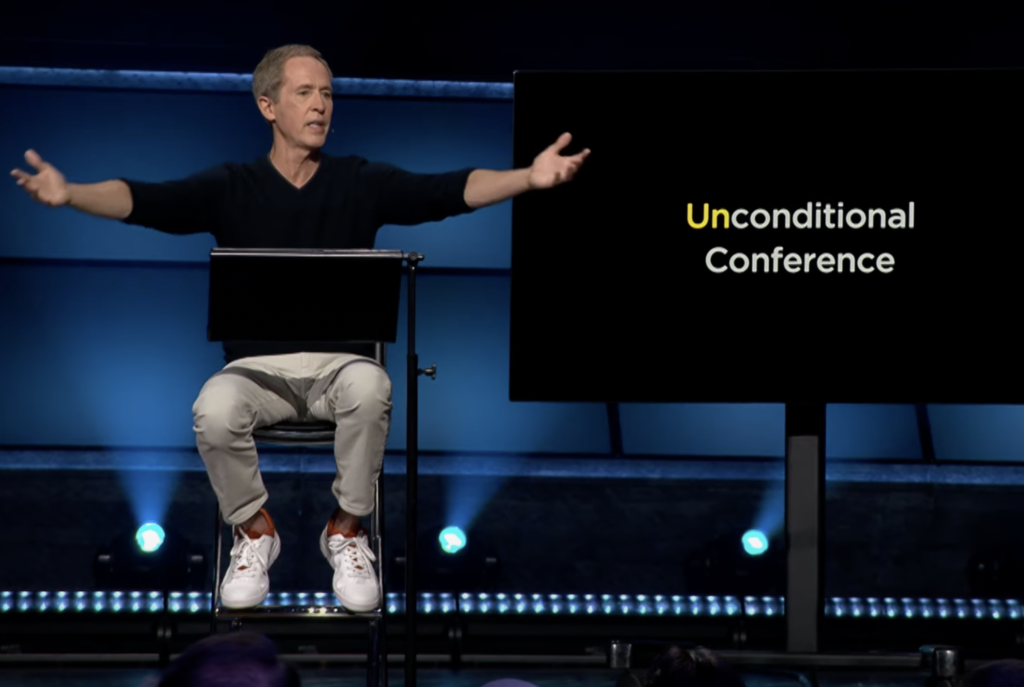
NASHVILLE (BP) — Andy Stanley has said controversial things before. He said small churches are “selfish” and “inferior to big churches” in 2016. Two years later he said Christianity must be “unhitched” from the Old Testament. The list goes on. But his latest comments on LGBTQ issues seem different to journalist and commentator Warren Cole Smith.
They may represent a fork in the road for evangelicalism.
“Andy has a habit of making misstatements in public and then walking them back,” said Smith, president of Ministry Watch, a watchdog group for Protestant ministries. “I find that frustrating. I wish he wouldn’t do it.” But this time “Andy didn’t just misspeak.” His views were programmed, his statements planned.
Stanley’s view of homosexuality and transgenderism took center stage when North Point Community Church in Alpharetta, Ga., where Stanley is pastor, hosted the Unconditional Conference on LGBTQ issues last month. The event featured speakers in same-sex marriages. In a sermon following the conference, Stanley affirmed biblical marriage but added that “living a chaste life” is “not sustainable” for many with same-sex attraction.
The conference and subsequent sermon, Smith said, undercut a foundational Christian doctrine: marriage, which appears in the Garden of Eden in Genesis, the marriage supper of the Lamb in Revelation and is assumed on every page between them.
Theologically conservative Christians face a decisive moment in their response to Stanley’s views, Smith and others say. Adopting his position could hasten American evangelicalism’s decline.
Evangelical commentators, including Southern Baptists, responded quickly to Stanley’s sermon. The next day Albert Mohler called it “a major departure from biblical Christianity” in his podcast The Briefing.
“It is impossible to imagine the apostles conceding that obedience to God’s Word might be unsustainable for some believers,” said Mohler, president of Southern Baptist Theological Seminary. “In this case, we’re talking about more than just unhitching the church from the Old Testament, as impossible as that is, we’re actually talking about what has to be defined as a departure from the Gospel.”
Sam Allberry, an author and pastor who has discussed publicly his own battle with same-sex attraction, took issue with Stanley’s “mixed messaging about sin” and his apparent downplaying of the need for repentance.
“To accept that a biblically prohibited relationship is permissible – or the least-bad way forward – is to contradict the biblical sexual ethic Stanley affirmed in this very sermon,” Allberry wrote in Christianity Today. When “any leader suggests to me that chaste obedience to Christ in singleness is not sustainable, he is saying the very same thing to me that the Devil says.”
Yet with the West’s constant cultural dustups over homosexuality and transgenderism, is this episode really worth elevating? Yes, says Houston Christian University (HCU) professor Robert Gagnon, because “Stanley’s situation” could “hasten the decline of the evangelical world.”
“Holding an orthodox position on sexual ethics doesn’t simply mean saying homosexual practice and transgenderism are sins,” said Gagnon, an HCU professor of theology who specializes in the Bible’s teaching on sexuality, “because sins can be minor, or they can be major and egregious. Clearly, Stanley regards [homosexual practice] as a relatively minor sin.”
Downplaying the seriousness of homosexuality normalizes it, he said. That was a subtle and insidious part of Stanley’s sermon – and an especially destructive error if others follow his lead.
When same-sex sexual acts are placed on par with gluttony, for example, biblical ethics have been compromised, Gagnon said. If a man confesses to his wife that he ate dinner with friends and “really pigged out,” he can reasonably expect her quick forgiveness for his gluttony. But it would be absurd to confess a homosexual affair and expect the same quick forgiveness.
“One [sin] is relatively minor on the scale, and the other is huge,” Gagnon said. “Essentially, Andy Stanley is treating the two [sins] as equivalent. It’s absolutely extraordinary.”
Stanley’s situation is among the “inevitable consequences” of what Smith calls evangelicalism’s “crisis of authority.”
Churches are unhinging themselves from denominations, not wanting anyone to tell them what to do. Pastors are trying to formulate theology for themselves rather than grounding their doctrine on orthodox formulations worked out over centuries by faithful believers, according to Smith.
“We have a lot of do-it-yourself, make-it-up-as-you-go-along theology in the evangelical church right now,” Smith said. It’s unhealthy to have “men and women in positions of prominent leadership in the church that are still working out their theology.”
The proliferation of nondenominational megachurches – like North Point – illustrates the growing desire of Christians to free themselves from accountability to a family of churches, Smith said. In 1970, there were only 15-20 Protestant megachurches in the U.S. (congregations with more than 2,000 in attendance), almost all of them within denominations. Today, there are nearly 2,000, with a quarter claiming independent or nondenominational status, by Smith’s count.
Perhaps a denomination could have helped Stanley refine his views. Hopefully, biblically grounded denominations will help other churches rein in their temptations to accommodate culture, Smith said.
Yet a strong denomination should not lull pastors or churches into theological complacency. The SBC in particular should be warned by Stanley’s doctrinal compromise, Gagnon said.
“Within a generation, even a place like the SBC can fold” on LGBTQ issues, Gagnon said. “I know it sounds unthinkable as of now. But think about the fact that in the case of Andy Stanley, in one generation we’ve gone from his conservative father, [former SBC President] Charles Stanley, to Andy Stanley effectively opening the door for acceptance of homosexual practice and transgenderism.”




















